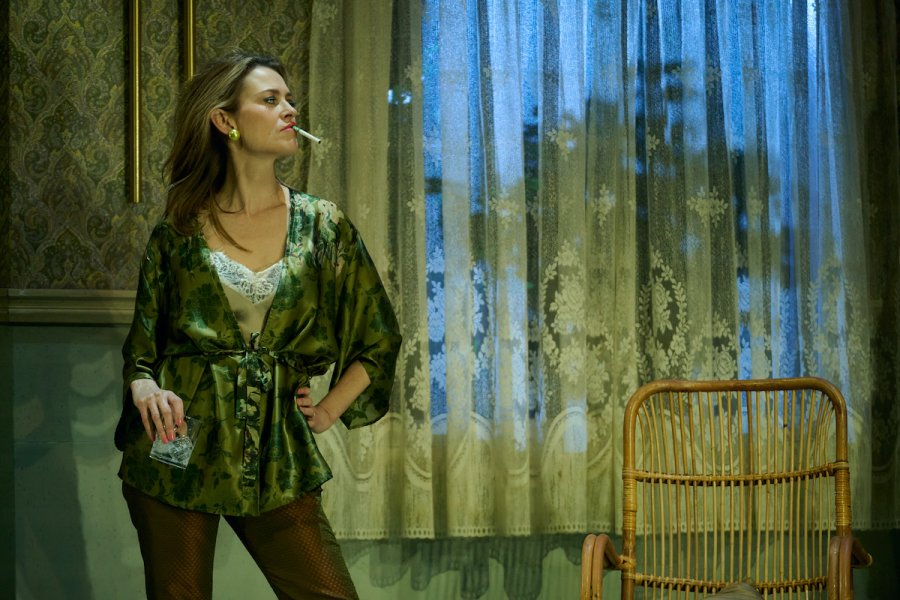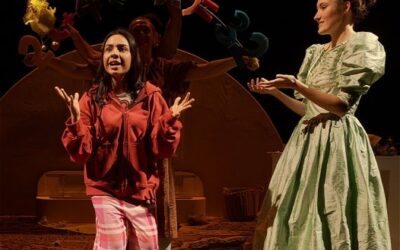By Darby Turnbull
As the kids say, George and Martha match one another’s freak. Edward Albee’s 1962 treatise on marriage, America and the toxic rot beneath them has been entrancing audiences for over 60 years, through countless revivals and the iconic film adaption. Unfortunately, I missed Red Stitch’s production last year but through some divine intervention (or rather savvy investors) their lauded production is their first to be transferred onto the Melbourne larger theatres complete with their original company, I wouldn’t be at all surprised if it tours. Australia has been having a mini renaissance of mid-century American classics, Death of a Salesman across the road at Her Majesty’s last year, The Odd Couple was the previous tenant at the Comedy, both toured to Sydney, Streetcar Named Desire opens at MTC this week. It speaks quite potently to the state of our theatre right now; plays are more cost effective than musicals; the classics hold continuous commercial appeal; their political and social commentary is far enough in the past to reach a mass audience. Who’s Afraid of Virginia Woolf directed by Sarah Goodes brings Albee’s text thrillingly into the 21st century, not that it’s ever shown signs of wear, with a resoundingly intelligent and passionate revival from one of our finest companies.
The transfer from Red Stitch’s tiny stage to the Comedy Theatre feels like an organic, fresh transition. Friends told me that the power of last year’s iteration was the feeling of being in George and Martha’s living room as their twisted, alcohol fuelled sadomasochism enveloped them both and their guests Nick and Honey. Goodes’ and Designer Harriet Oxley have made some smart and incisive adjustments beyond simply making the set larger. The theatre itself becomes a key player in the drama, from George (David Whitley) and Martha’s (Kat Stewart) first appearance in the balcony to their entrance through the stalls to the snug living room set framed by lush velvet curtains which evoke old school glamour but also trap them in a diorama like cycle of abuse and anguish. You feel like George and Martha are condemned to repeat these dark nights of the soul like actors in a melodrama of their own making. Grace Ferguson and Ethan Hunter’s sound design seamlessly evoke the old school noir and knowing aural cues that are occasionally intrusive but enhance the performative aspects of the play. Matt Scott’s lighting is sleek but moody, I particularly admired how the mustard velvet drapes alternated between lush and sickening alongside the mental and moral decay on the stage.
Real life married couple Kat Stewart and David Whitley’s dynamic is sublime; their interpretations of the role are invigorating in how fresh and natural they feel. What feels unique is that George and Martha still clearly have love, passion and some mutual regard; not that they’d ever admit it. Their opening scene is disarming in how casual and comfortable they are with each other, Stewart’s teasing is more knowing, Whitley lets slips a few looks of adoration; it’s only at the arrival of their guests that they’re ‘on’. This George and Martha need an audience and boy they give them one hell of a show.
The vitality they display fit well with Stewart and Whitley who in opposition to the usual casting and character designs aren’t portraying these characters in physical decay; they’re both fit, attractive and active and they use those features to highlight increasingly fascinating layers to their roles.
Whitley brings a mercurial intensity to George who despite believing he’s been defeated and emasculated is really the one in control here. Like a vampire prowling the stage he seems to gain sustenance from the drama that unfolds. Far from being ground down by life, his George needs to feel like a victim and needs a smaller stage to pontificate.
Stewart, given her success across mediums has been at the forefront of the publicity despite this being very much an ensemble piece, is stunning as Martha. She shows a woman of thwarted intellect with few proactive avenues to flex her considerable insights. Stewart’s naturalistic acting style actually fits quite elegantly within the text that usually invites a more exhibitionistic approach. Over the three hours she provides a mosaic of beautifully timed revelations into Martha’s psyche. The amount of fun she seems to be having with the role is infectious, the laughs feel fuller, the pathos more painful. The gift that she and the cast give is not to allow a sense of reverence for the play, author and roles to take over so that the play can feel completely lived in.
Albee’s writing is an absolute dream for actors, combining arch, cutting dialogue with fiery anger and disgust at the mendacity of post WW2 America and deep mourning for the impact it has on the lives caught within it. More than ever, I felt keenly aware of the America that exists outside of George and Martha’s academic abode; the threat of nuclear war, the anti-intellectualism, the purging of communists and gay people from government and public life, the demand for ethnic and sexual conformity and the punishments that exist for people who don’t fit the ideal of the suburban, nuclear family. Albee, a playwright whose homosexuality was an open secret in the theatre world is able to subtly challenge and undermine compulsory heterosexuality and gender binaries.

Enter Nick and Honey. Audiences and critics have erroneously, in my opinion, dismissed these two characters as being inferior foils and punching bags for the more bombastic George and Martha. I don’t believe so, the casting of Emily Goddard and Harvey Zielinski completely belie that anyway. Goode’s direction deftly explores so many possibilities for what Nick and Honey’s life could look like; are they looking into their future with George and Martha? Horrific certainly but there are so many nuances that emerge beyond voyeuristic sadism, namely Nick and Honey opening up to the choices they may be denying themselves? Namely this production gets a little queer, and I love it.
Goddard’s Honey, especially in the first part of the play, interacts with Martha with unconcealed, hungry desire which Stewart’s Martha plays into. Goddard’s Honey, infantilised and awkward, begins to emulate the more sophisticated (in her eyes) Martha and starts to melt into her. Likewise, Nick’s interactions with George have a mild sexual charge despite their mutual disgust and mistrust.
Zielinski crafts a wonderful arc for Nick, imbuing him with the kind of smug entitlement that comes from a lifetime of being rewarded for successfully performing masculinity, deluding him about how much power and influence he actually has, his casual cruelty to and about his wife the most disconcerting. Being ritually humiliated and challenged feels like an almost essential rite of passage, the terror etched on Zielinski’s face in the closing moments of the play profoundly displays the crumble of his worldview and it’s up to us what this will mean for him.
Goddard is an actor I’ve long admired for her singular ability to play up the disconcerting weirdness of human nature. Her Honey seems very familiar with conflict and seemingly willing to debase herself to diffuse it, her frequent lapses in health and naive comments take on far deeper resonance when combined with Goddard’s non-verbal responses. She even gives Sandy Dennis’ famous ‘I dance like the wind’ a run for her money in a bravura interpretation. It’s a gutsy, bold performance that’s modulated perfectly to different acting styles of her colleagues.
I’d be remiss if I didn’t point out that this productions understudies, Kate Cole, Garath Reeves, Laurence Boxhall and Jing Xuan-Chan would all undoubtedly give enviable performances if called upon to fill in.
It’s pretty much taken for granted that this is unmissable theatre at this point, and I hope that this won’t be the only time that a Red Stitch production transfers to the commercial stage. As much as I enjoy the classics, especially done on this level, I can only hope that audience demand will increase to other playwrights beyond Albee, Simon, Miller and Williams to include contemporary and lesser-known texts.
Images: Eugene Hyland





